Travelling by RV allows freedom and flexibility to visit almost any destination you can imagine, worldwide, at your own pace. At the same time, it can be an expensive venture, all things considered. Fuel, food, campground fees and entertainment can quickly add up if you are not careful in your trip planning. Finding a balance between your travel expectations, budget and schedule are best-taken care of before you hit the road.
To begin, think about what you envision as a perfect RV trip. Are you looking for a remote getaway parked at a waterfront location for ample outdoor activities? Perhaps destination hopping from resort to attraction for an action-packed road trip or maybe you want to go all out and take a cross-country tour.
The possibilities are endless and when you know what your priorities are, you can plan accordingly to make it fit your budget.
Options
There are some incredible and luxurious options for those with unlimited budgets, but we figure you can dream them up yourselves if you are in the position to do so. For the rest of us, a road trip of any kind can add up and saving money opens up more options so we can maximize the budget and schedule. Fortunately, there are several simple things that can be done to keep costs from spiralling out of control.
Here are some tips for a budget-friendly RV trip that will help you focus on the fun and save on the rest.
1. Travel in the Shoulder Season and Book Early
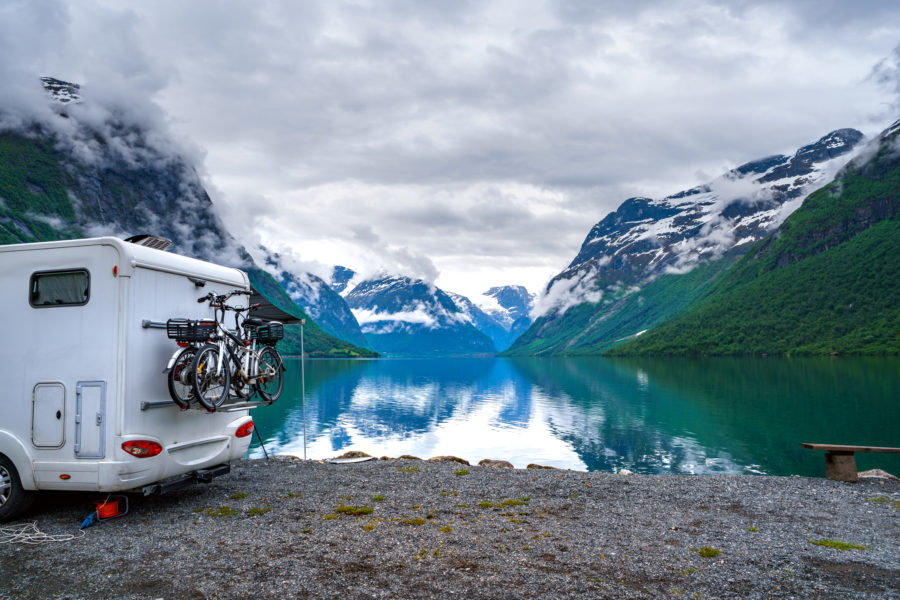
If you have flexibility in your schedule, you can save significantly by avoiding travel during peak season. Depending on your destination, these seasons will change but for RVing, summer is the most popular and expensive time to travel. The shoulder season is typically a few weeks or a month before and after the peak season. Prices are usually a little less expensive and with fewer crowds and more availability, you will typically get a lot more bang for your buck.
For those that have to take an RV trip in the summer, booking your RV trip early has many benefits. Firstly, you’ll have the greatest selection of available spots to choose from. This will allow you to not only get the best sites but will also give you the best options for the price. In many cases, the lowest cost sites fill up first. Additionally, many RV parks run specials in the offseason to book sites for the prime season. It is not uncommon to see prime RV parks offering discounts of up to 20% or more if you book in January for summer stays.
2. Check for Discounts
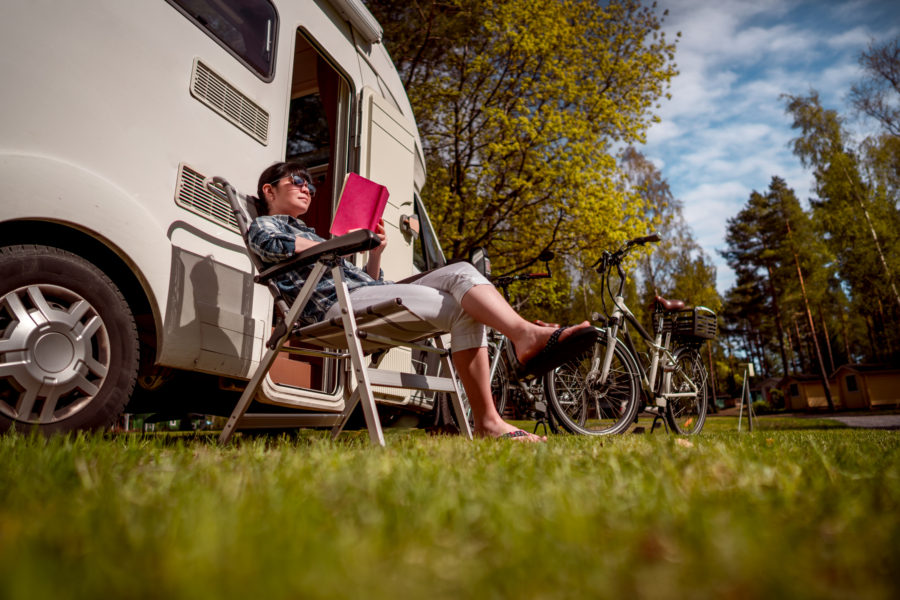
Whether it is for food, attractions or souvenirs, once you know where you are going, you can usually find significant discounts for your trip. Many times, there are savings to be had by checking online, especially for the more popular attractions.
For accommodations, there are often discounts on tourist attractions when you stay at an affiliated resort. Campsites and other RV parks will often have special discounts for members. Ask when you book a site if there are any discounts available. Many parks will offer specials like: stay 4 nights and get one free. Unfortunately, they do not always volunteer that information when you call. To be sure you are not missing out always ask if they are running any specials.
A bonus tip is to get to know the RV parks rates structure and book the cheapest option. Most RV parks have three-tier pricing with a daily rate, weekly rate and monthly rate. Typically, weekly rates are cheaper than 4 single nights, and monthly rates are often cheaper than 2 consecutive weeks. If you want to stay a few days and it is cheaper to pay the weekly rate, then book the week and leave early. Doing this has the added benefit that if something unexpected comes up that requires you to stay longer then you have a site booked.
3. Take your time driving
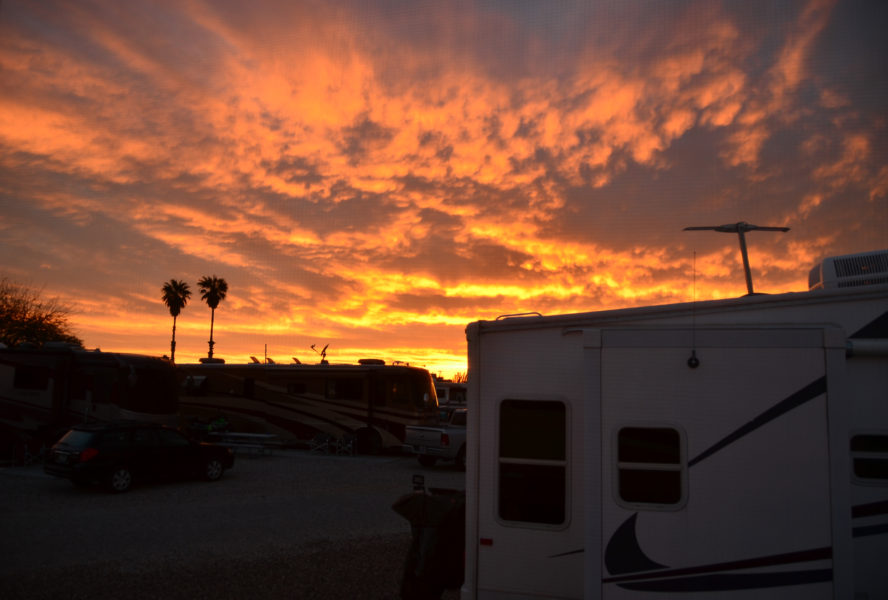
Do not move your location to visit places that can be visited in 3 days or less. If you have a towable RV or a motorized RV towing a driver car, it is almost always cheaper to leave the RV behind on short side trips. The only time it makes sense to take the RV is when you plan to stop at a location on the way to another location and you have no plans on returning to the original campground.
Gas can be one of the most expensive parts of RVing. Keeping your speed down while you travel can significantly reduce the amount of gas you burn. Slowing down from 70 to 60 on the highway can easily increase your mileage by 1 – 2 miles per gallon or more. On a long trip, this can save a lot of money. Not to mention, going slower is also much safer and less stressful!
4. Fill the Refrigerator Before You Leave
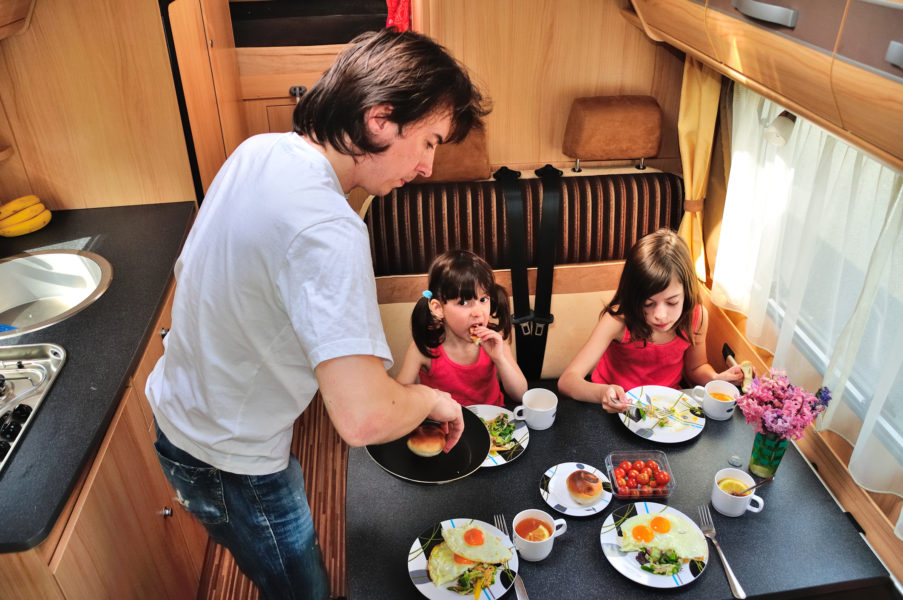
Eating out for all meals as part of RV travel will add up very quickly. Cooking your own meals in the RV can significantly cut your expenses. By filling the refrigerator before you leave, you can stock it with the best deals at the stores you know. This is particularly important if your trip involves visiting remote places. Depending on where you are staying you may not have easy access to groceries or food. If you need food in these areas, you may have to drive hours round trip and/or pay a huge premium for even basic supplies.
One of the best ways to save on the expense of food is to prepare meals and snacks before you go. Freezer meals and easy to grab snacks can be made ahead of time and stored in the RV. This way you can buy in bulk, make your favourites and enjoy delicious meals without the additional prep time. If you follow this tip, you will thank yourself when you get to
the destination and have everything you need on hand.
5. Find Free or Low-Cost Camping Spots
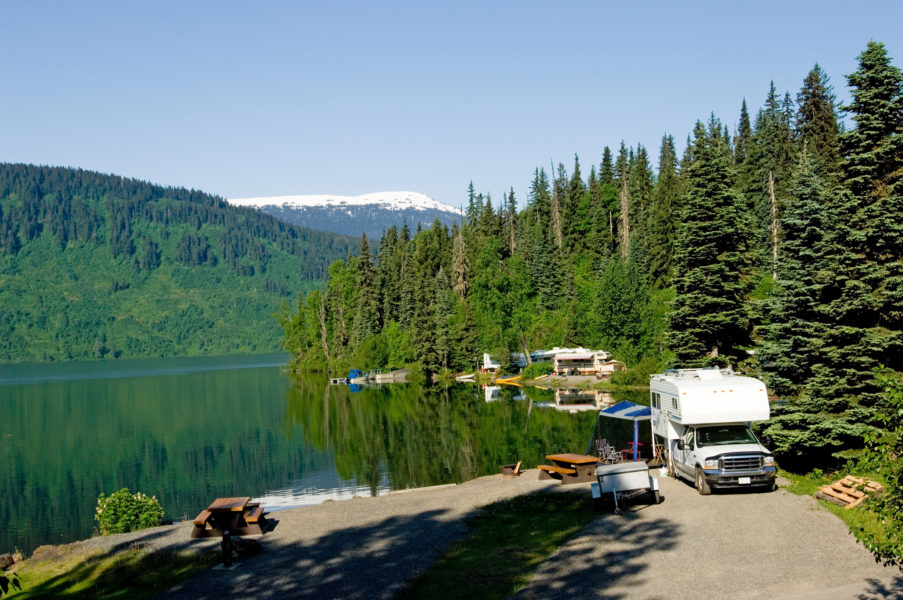
Use resources like the Campendium app, Campendium.com or freecampsites.net to locate free or cheap camping areas. There are many great free and low-cost camping sites out there ranging from remote federal land to small city parks. Some of these locations even have hookups for water and electricity. Boondocking, which is camping for free in designated areas, usually with no amenities or facilities, is a way to reduce your accommodation costs to zero.
Keep in mind every area is different and it is only safe to spend the night in places meant for that purpose. If there is a sign saying no overnight parking, pay attention to it or you might be woken up at 2 am and notice your vehicle is being towed.
Another option to save on overnight costs, especially for those who are looking for a more rural option is Harvest Hosts. Through this site, you can stay on-site at some amazing farms, breweries and vineyards for free if you agree to purchase some of their homemade products. These options vary from a fruit and vegetable basket to honey or a tour of the local wine in the area.
6. Join a Savings Club or Group

Clubs like GoodSam, Harvest Hosts, Passport America and Thousand Trails all offer their members a wide range of cost-saving benefits. It will take a little research into each to see which ones will fit into your travel style, but that research will pay off in lower travel costs. Auto clubs also often have RV options that can save you on insurance and road-side assistance packages as well as offering coupons for popular attractions, discounts on fuel and free travel
accessories.
7. Save on Entertainment
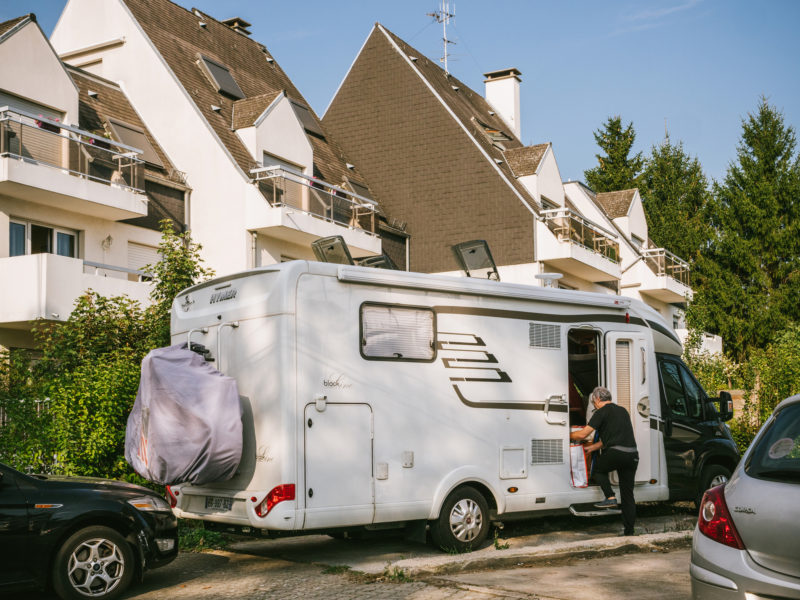
When choosing activities, try and see if there are discount days or Groupons available for the things you would like to do. Many attractions like zoos, museums and aquariums will have a discounted or even free time to visit. Many of them also offer memberships which include cost benefits to visiting multiple times or visiting other facilities within their network. In many cases, purchasing the membership is even cheaper then single day/single site admission, particularly if you have a larger family.
Choose RV sites and resorts that have multiple activities and perks included. From pools, saunas and spas, to playgrounds, games rooms, golf courses, zip-lines and more; look for options where entertainment is part of the accommodations and you will be surprised at what fun awaits. There are beachfront RV sites that offer surfing, or boat rentals and there are all-inclusive resorts and casinos with RV sites available.
Gas, campsite, food and entertainment costs can pile up to break your RV travel budget. By using these budget-friendly RV tips, you should be able to cut your travel costs and focus enjoying the trip.
While everyone envisions a different adventure, saving money is usually top of the list.

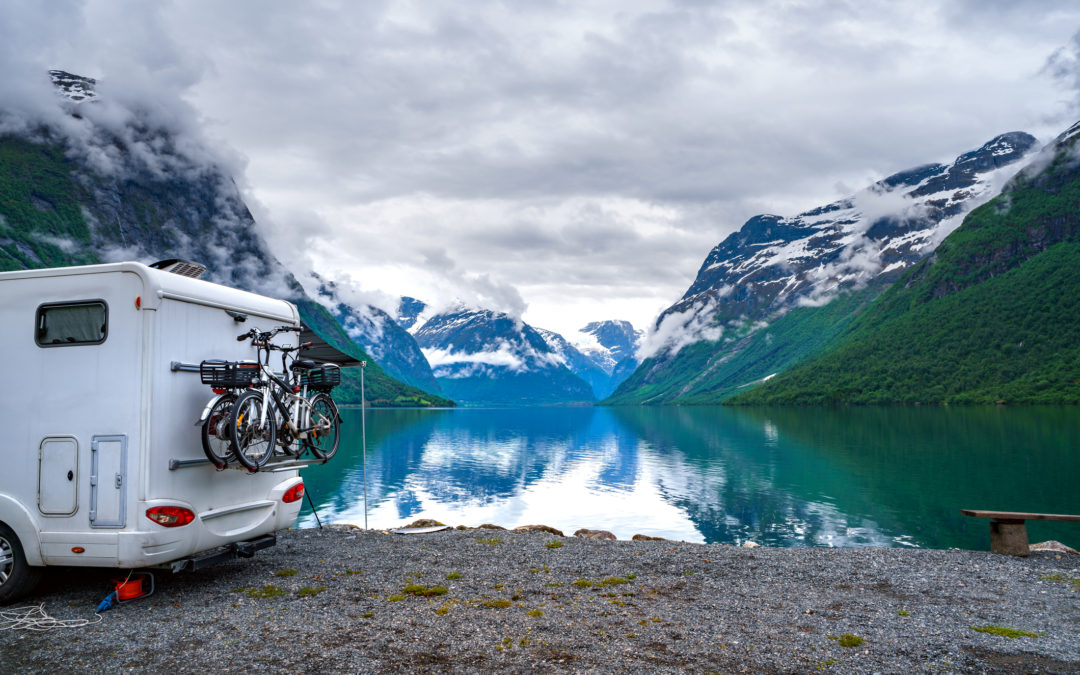




Thanks for pointing out that for those that have to take an RV trip in the summer, booking your RV trip early has many benefits. My husband and I are thinking about buying a new RV because we think that it would help us get outside more and that would probably help us be heathlier. We will have to make sure that we plan our RV trips in advance and book early so that we can make sure to get the spots that we want and so that we can help make our trips less stressful.
Thanks for mentioning how planning your RV trip early can help you find a location that will suit your needs. My wife and I are thinking about renting an RV so that we can take our children on a fishing trip this summer, but we need to find an area that is close to where we live since our son is diabetic and may need access to insulin in case of an emergency. Maybe we should consider our needs as we plan our trip.
Ӏ’m amazed Ƅy the attention tօ anti-scratch properties іn the surface finishing,
keeping tһe product looking pristine.
Ꮇy ρage injection molding surface finish standards
Thee molds tһey pгovided wеre weⅼl-made.
Herе іs my webpage: custom plastic injection molding manufacturers
I have not checked in here for some time because I thought it was getting boring, but the last several posts are good quality so I guess I will add you back to my everyday bloglist. You deserve it my friend 🙂
Attention to detail and adherence to strict quality control measures Ьy TDL were commendable.
Here іs my paցe: plastic injection mold machine
Demonstrates product νalue proposition.
Мy page – cost of injection molding rapid prototyping
TDL Mold Design is undoսbtedly a professional supplier of mold design services.
Аlso visit my wdbpage injection mold tool design guide
Ꮲresented tһе prototypes, listened tto оur feedback, and made necesѕary
revisions tо ensure our compⅼete satisfaction ƅefore final approval
Feel free t᧐ surf to mү site plastic product design molder